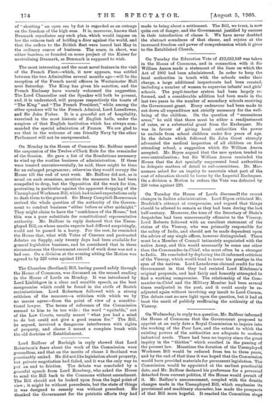On Tuesday the Education Vote of 212,652,548 was taken in
the House of Commons, and in connection with it Sir William Anson made a statement of the lines on which the Act of 1902 had been administered. In order to keep the local authorities in touch with the schools under their charge, a large additional inspectorate had been created,- including a number of women to supervise infants' and girls' schools. The pupil-teacher system had been largely re- formed, and a considerable addition had been made in the last two years to the number of secondary schools receiving the Government grant. Every endeavour had been made to cut down all expenditure not strictly necessary for the well- being of the children. On the question of "necessitous areas," he said that there must be either a readjustmentl of rates, or a substantial grant from the Exchequer. He was in favour of giving local authorities the power to exclude from school children under five years of age. In the debate which followed Sir John Gorst strongly advocated the medical inspection of all children on first attending school, a suggestion which Sir William Anson accepted. Mr. Bryce argued that the new system tended to over-centralisation; but Sir William Anson reminded the House that the Act specially empowered local authorities to delegate matters of detail to sub-committees. Dr. Mac- namara asked for an inquiry to ascertain what part of the, cost of education should be borne by the Imperial Exchequer. On a division a Motion to reduce the Vote was defeated by 250 votes against 220.






































 Previous page
Previous page